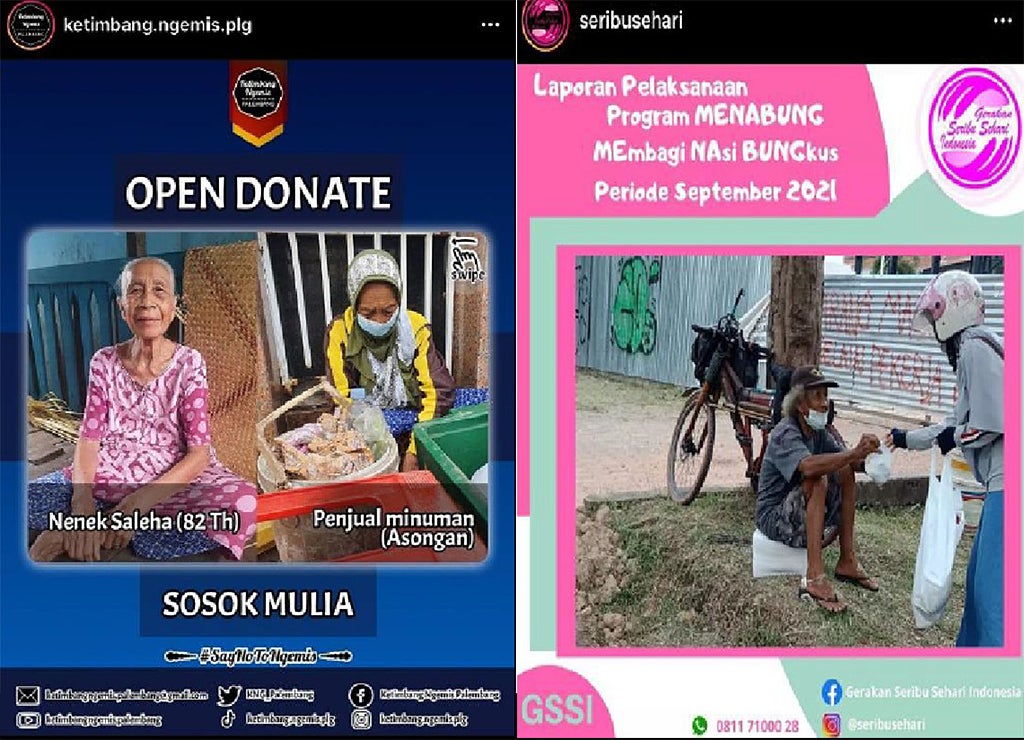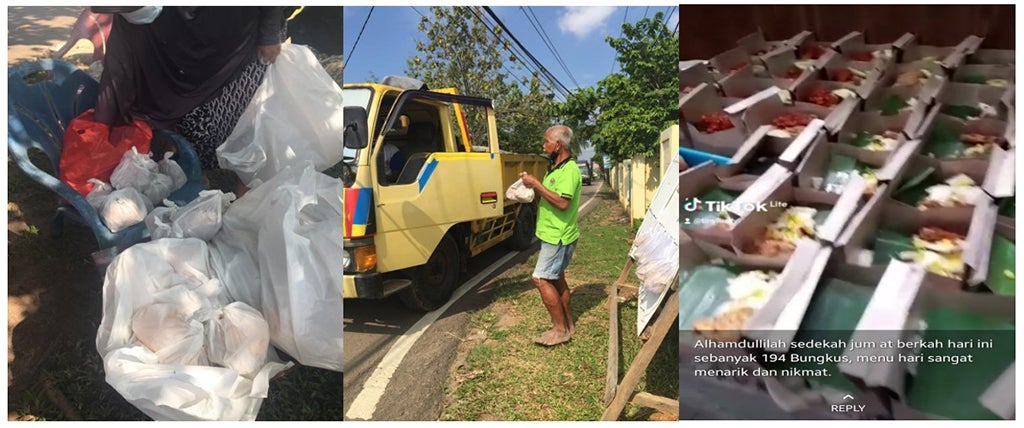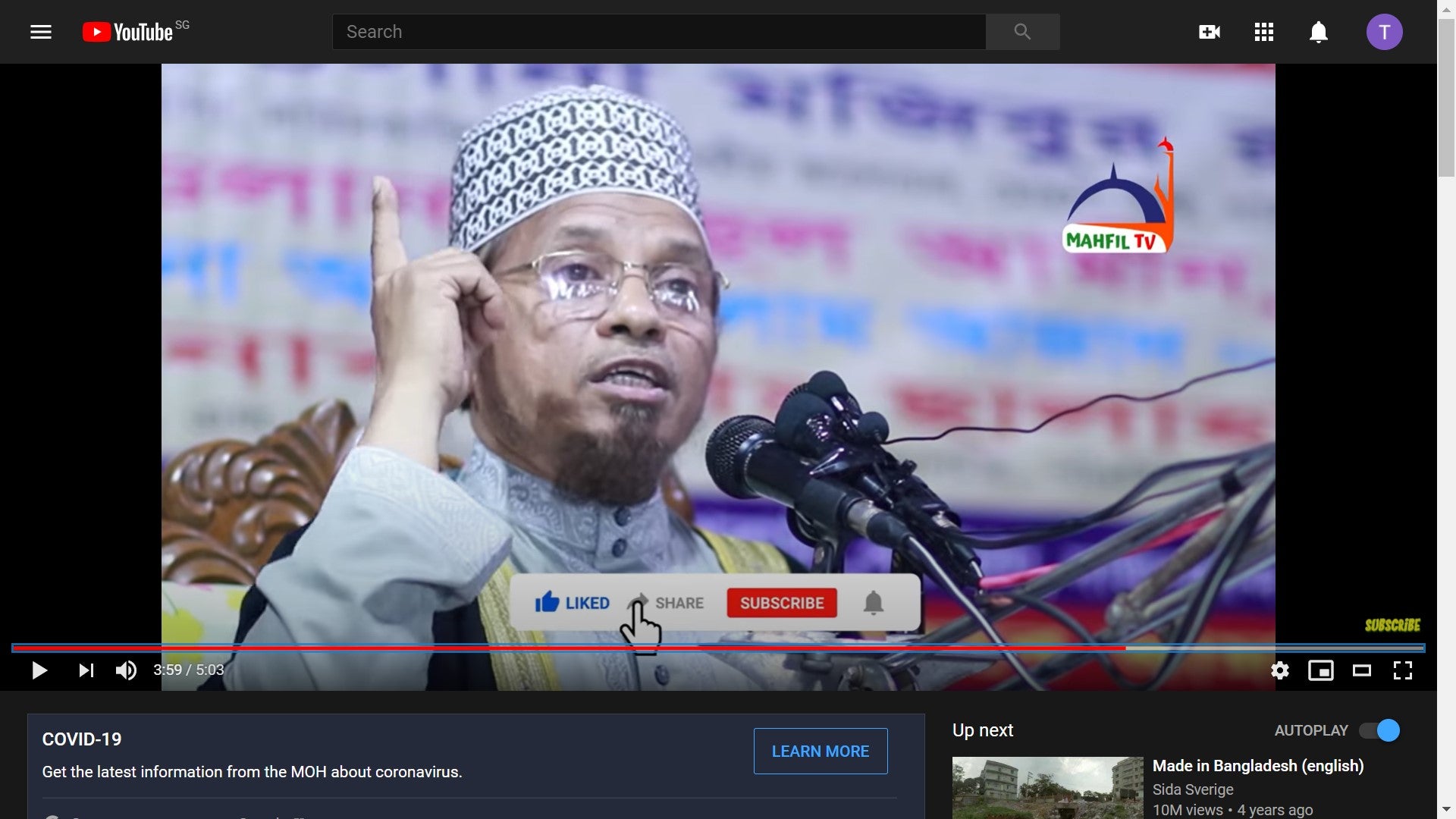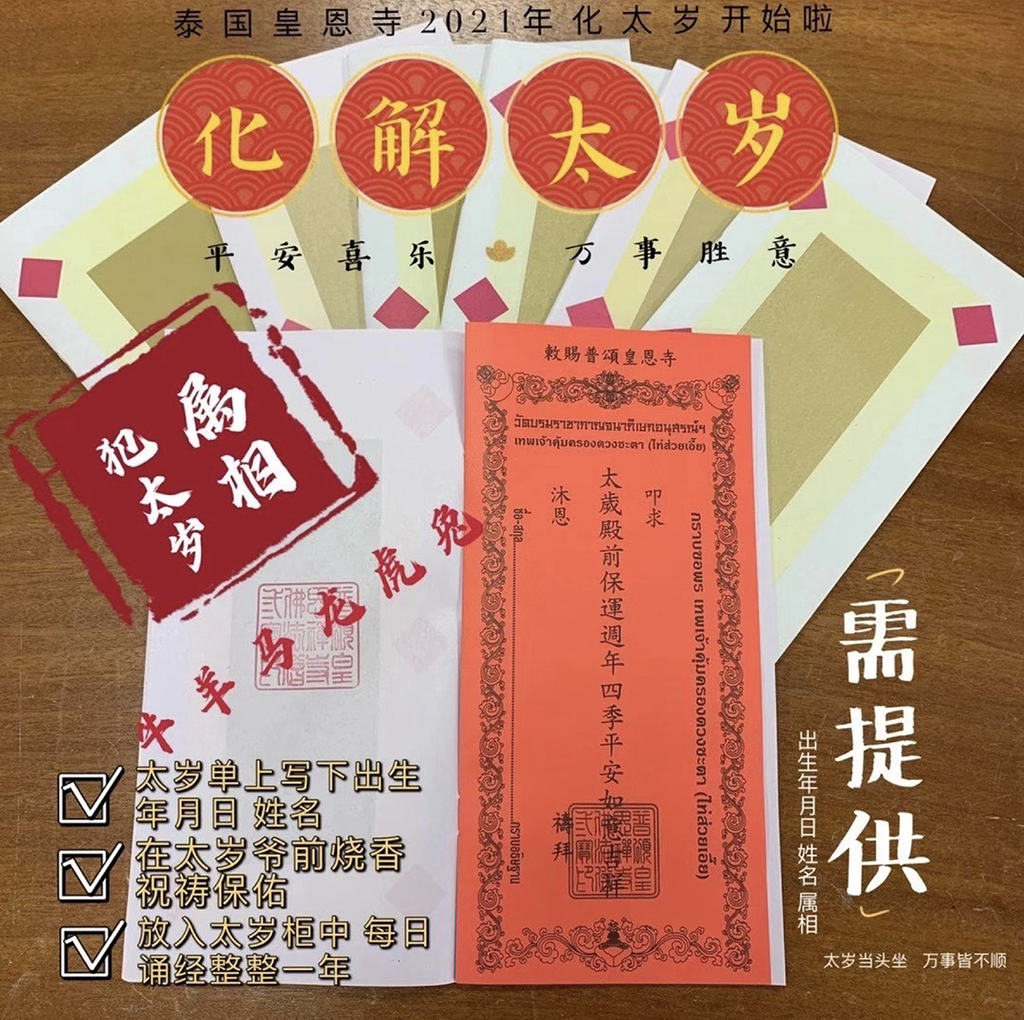An Equal Gift of the Pandemic: Sedekah in Palembang
contributed by Achmad Firas Khudi, 2 November 2021
Almsgiving has long been a tradition in the Muslim society of Palembang City, Indonesia. As a result of the COVID-19 pandemic, almsgiving has transformed into both a social media practice and a project of urban development. The Bukit Lama community, Better than Begging, and One Thousand per Day— three non-governmental organizations dedicated to almsgiving— have been important actors in initiating a renewed practice of almsgiving during the Covid crisis. Almsgiving, increasingly an important source of charity given the economic effects of the pandemic, was initiated by a group of mothers from Komplek Politeknik of Bukit Lama district three years ago.
These actors are motivated to help the poor as a means of fulfilling their obligation to do good deeds laid out by a specific verse of the Quran, Al-Baqarah 261, which mentions the manifold rewards for spending one’s wealth on alms following the way of Allah. In general, the organizations use offline and online modes to arrange alms donations, programming, and delivery. The Bukit Lama group shows community-based initiative and simple programming, while the two other organizations employ well-developed organizational activities. The spiritual motivation behind almsgiving practices during the pandemic appear prominently in the groups Bukit Lama, Better than Begging, and One Thousand per Day.
The alms practices allow these three organizations with specific logics of action to strive toward equality by assisting the poor during the pandemic. Such practices include giving and distributing alms, which demonstrates piety and humility. Changing economic and social conditions brought on by the pandemic have impacted the urgency of alms as well as the method of delivery to accommodate social distancing. These local groups organize alms delivery through onsite and online techniques with the primary aim to help the poor and consistently nurture the rewards of deeds or amal.
The Creative Ways of Almsgiving for the COVID Pandemic in Palembang
The three almsgiving organizations have developed creative almsgiving programs during the pandemic. The Bukit Lama mothers vary the types of almsgiving based on available goods and possible modes of delivery. Various food items and daily necessities, in addition to house repairs, are offered to ease the pandemic burden.
These creative innovations on almsgiving also happen in a more sophisticated way in the other two organizations. Better than Begging and One Thousand per Day regularly survey their potential alms receivers and members are divided into delivery teams. Better than Begging initiated their almsgiving in 2015, and Palembang is one regional chapter of the organization. Their almsgiving approach includes promoting poor sellers to help them attract more buyers, and as a result, increase their income. Sellers in financial need are promoted through the group’s Instagram page, where they are labelled sosok mulia, signifying “noble figure”. One Thousand per Day focuses on street delivery for primary daily necessities (sembako). Like the picture below, their Instagram account usually announces a specific route where their “alms troops” or laskar sedekah will deliver the donations in Palembang. Different actors, applying creative modes of alms delivery, have consistently helped the poor during the pandemic.

Source: Instagram @ketimbang.ngemis.plg and @seribusehari
The COVID-19 pandemic has shifted the meaning of almsgiving, in addition to the modalities of alms as applied by the three organizations. Most of them agree that the pandemic is a disaster, yet it is also a test to demonstrate Muslim piety by giving more alms. The alms program showed some dynamism since the start of the pandemic happened, with some charitable activities increasing and others decreasing. One Thousand per Day stopped their usual almsgiving aimed to sponsoring circumcision for seventy orphan kids, while they increased alms spent on primary daily necessities, in view of the unemployment resulting from the pandemic impact. The same change happened in two other organizations. The alms organizations have seen how the economic hardship that ensued the pandemic has disproportionately impacted the poor. This produced a renewed interest in the practice of almsgiving. They have increased their giving during the pandemic as part of their enhanced interest in performing ‘good deeds’.
The Bukit Lama community mentioned that their alms practices and other innovative programs are increasingly needed in the neighbourhood because many people have passed away. The pandemic situation, where many neighbours have suddenly died, also enhanced the impetus for almsgiving and the eagerness to donate more. (These phenomena had also been documented by Amelia Fauzia in the context of zakat: see these two articles on CoronAsur).
However, the regulations for safe distancing have required innovative approaches for distributing alms. Two members in a mothers’ group, Fauziah and Tiny, were involved in these innovations and also regularly corresponded with other community members. The mothers' group in Bukit Lama has thought of a creative way to address the new circumstances: by hanging food on a wooden board (see figure below). Fauziah, the alms coordinator and one of the leading activists, initiated the ‘hanging sedekah’, usually implemented after a quick survey of the number of needy families residing in the neighbourhood (Rukun Tetangga). As the alms coordinator, Tiny maintained the overall communication through WhatsApp for donations and delivery. She also managed a TikTok account (see figure below) to coordinate the logistics for the delivery of 194 rice boxes in the neighbourhood. Furthermore, they collected money from mothers to repair three houses outside their housing complex.
Better than Begging focused more on their “noble figure” online promotion while conducting various programs for alms respecting social distancing practices during the pandemic. They helped elderly people by promoting their products and services with the organization's Instagram account. The pandemic situation reduced the organization’s operation to the “noble figure” promotion and donations to support orphans. Before the pandemic, they usually conducted a monthly meeting in the first week of the month, and then sold things for alms in Kambang Iwak park in the second week.
Staff members have stated that organizing alms delivery for the poor has increased their sense of humanity. They reported a story where ‘the noble figure’ was a low-income family living on a big sewer in the Way Hitam area. Their house is regularly hit by floods during the rainy season, while one child in the family has epilepsy. Members of Better than Begging said that witnessing such struggles in urban life enables them to feel blessed and more grateful for what they have. The use of the ‘noble figure’ label to promote products and small businesses and to attract alms donations has become the primary instrument of Better than Begging.
The almsgiving practices of One Thousand per Day is more oriented towards poor children and individual (rather than group) arrangements for aid distribution, compared to the other two. The organization previously used to take children out of the orphanage every month to bring them to places with games and entertainment, handing out prizes for them, but the pandemic stopped such practices. The organization staff also changed the alms of primary daily necessities through the deployment of “alms troops” with individual distributors in order to reduce crowding and lower the potential for viral transmission. There is another ongoing program through a scholarship for orphans who maintain high academic achievement in their school.

Source: Informant of Bukit Lama and TikTok @tinyfuady
The Development Dimension of Alms: Improving Equality during the Pandemic
The flourishing practice from community members and organizations necessitates a deeper look into the development dimensions of the almsgiving and its relation to both religious and local traditions in the context of the pandemic. Urban residents with various ethnic backgrounds in Palembang participate in the local alms culture. The participation of urban residents can be connected with the high charisma of Islamic clerics or ustad in Palembang. Sakai (2017) explains this phenomenon with the metaphor of a peanut who always remembers its skin, to describe how Gumay people who migrated elsewhere come back to disburse alms as an act of remembrance directed at their homeland.
Moreover, most ethnic groups often associate cultural events such as weddings, child circumcision, and various celebrations to sedekah by inviting people for a feast. The preaching of ustad emphasised how giving alms can help their closer family as well as the ethnically diverse inhabitants of Palembang city to survive the pandemic. The preachers therefore played a role in disseminating more alms to help the urban poor in Palembang to minimize the impact of the pandemic.
Urban development plays a strategic role in upscaling current alms practices during the pandemic in two ways, including religious affairs and pro-poor policy. Kailani and Slama (2020, 83) reported that Islamic charity, including alms, is considered significant for economic gain exceeding social welfare and justice. The economic value of alms requires the engagement of more spaces to optimize the benefit through the network of mosques and local governmental institutions.
First, there is a proposal to integrate the almsgiving operation within the mosque network of the Ministry of Religious Affairs or SIMAS (Sistem Informasi Masjid, 2021) linked to the ‘smart city’ program. This would help to link almsgiving with real-time information on which mosques have alms stocks for the poor during the pandemic in Palembang. Second, almsgiving from the three organizations described above also functions to help housing, elderly people, and orphans. The Palembang city authorities could integrate the current almsgiving into their yearly and midterm development planning with more sophistication. The department of housing and social affairs could work together with the three local organizations to address urban poverty in Palembang. The mosque network and cooperation with governmental institutions could strategize the almsgiving to reduce inequality during the pandemic.
References:
Kailani, N., & Slama, M. (2020). Accelerating Islamic charities in Indonesia: zakat, sedekah and the immediacy of social media. South East Asia Research, 28(1), 70-86.
Sakai, M. (2017). Peanut Who Does Not Forget Its Skin: Gumay Identity, Islam, and Merantau/Migration in South Sumatera. (Translated by the author). Accessed on 10 August 2021 from https://www.researchgate.net/publication/321487921_Kacang_Tidak_Lupa_Kulitnya_Identitas_Gumay_Islam_dan_Merantau_di_Sumatra_Selatan.
Sistem Informasi Masjid, (2021). Information System of Mosque. Ministry of Religious Affairs. Accessed on 10 August 2021 from https://simas.kemenag.go.id/page/profilmasjid.
Disclaimer: The views and opinions expressed in this article are those of the authors and do not necessarily reflect the position of the blog editorial team or the Asia Research Institute.
South Asia | Southeast Asia | East Asia | Other Places | Hinduism | Buddhism | Islam | Christianity | Other Religions
Achmad Firas Khudi is a Master student of social science at Chiang Mai University. He is interested in scholarship on urban and development anthropology. His first book chapter, Planning for Sustainability and Resilience in Ternate: A Situated Knowledge, will be published in the Routledge Handbook of Urban Indonesia in 2022. He is currently writing a thesis on Jagged City: Habitable Conditions for Akuarium and Betawi People in Jakarta. As a teenager, he long served as an activist of Pelajar Islam Indonesia, one of the oldest youth movements in Indonesia.
Other Interesting Topics
Catholic Liturgical Televisuality in the Time of Pandemic
On the Catholic Church’s commemoration of World Communication Sunday last May 24, 2020, the Philippines marked day 69 of the state’s enhanced community quarantine (the strictest form of quarantine enforced in high risk places), which started on March 15. Expected to end by...
Shaping and Reshaping Traditional Culture in Bangladesh: The Folklore of Corona Times
In the pathways of history, the people of Bangladesh have gone through natural disasters, political turmoil, and man-made catastrophes. In response, they have fought, resisted and survived using their resourcefulness. Traditional cultures in Bangladesh have always been used as a way to increase spiritual and mental strength...
Commercialization and Transformation of Buddhist Temples in Thailand during the COVID-19 Pandemic
The global COVID-19 pandemic is a major public health crisis that has significantly impacted many countries economically and socially - economic depression, rising poverty, and social instability have accelerated. The everyday lives of people, traditional Buddhist ritual practices, and temple operations have also been affected, although the COVID-19 situation in many Southeast Asian...




